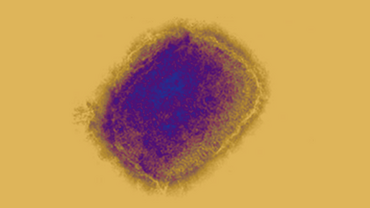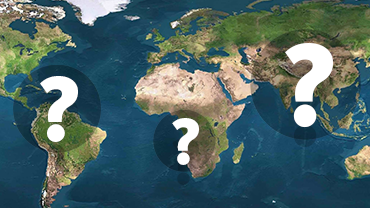Epidemiological update: Monkeypox multi-country outbreak
This report presents an update of monkeypox confirmed cases in the European Union/European Economic Area (EU/EEA) and worldwide.
Summary of epidemiological update as of 8 June*
Since the last update on 31 May 2022:
- 385 monkeypox cases have been reported from 16 EU/EEA countries: Portugal (95), Germany (92), Spain (78), France (49), Netherlands (28), Italy (15), Belgium (7), Ireland (6), Slovenia (4), Latvia (2), Norway (2), Sweden (2), Czechia (1), Denmark (1), Finland (2) and Hungary (1).
- 238 monkeypox cases have been reported from 8 non-EU/EEA countries: United Kingdom (142), Canada (55), United States (20), United Arab Emirates (9), Switzerland (6), Australia (4), Israel (1) and Morocco (1).
Since the start of the outbreak:
- A total of 704 cases have been confirmed in the EU/EEA.
- A total of 1 177 cases have been confirmed worldwide (including EU/EEA).
*Cut off for data collection: 8 June 2022 12:00. Data presented in this update are compiled from TESSy, official sources or, if not available, from public sources quoting national authorities.
EU/EEA update
As of 8 June, a total of 704 cases have been confirmed from 18 EU/EEA countries (Table 1, Figure 1). Most cases are in young men, self-identifying as men who have sex with men (MSM). There have been no deaths. The clinical presentation is generally described to be mild, with most cases presenting with lesions on the genitalia or peri-genital area, indicating that transmission probably occurred through close physical contact during sexual activities.
Table 1. Number of confirmed cases by country, EU/EEA, as of 8 June 2022
|
|
Confirmed cases |
|---|---|
|
Austria |
1 |
|
Belgium |
17 |
|
Czechia |
6 |
|
Denmark |
3 |
|
Finland |
2 |
|
France |
66 |
|
Germany |
113 |
|
Hungary |
1 |
|
Ireland |
7 |
|
Italy |
29 |
|
Latvia |
2 |
|
Malta |
1 |
|
Norway |
2 |
|
the Netherlands |
54 |
|
Portugal |
191 |
|
Slovenia |
6 |
|
Spain |
198 |
|
Sweden |
5 |
|
Total |
704 |
Figure 1. Geographical distribution of confirmed cases of monkeypox in EU/EEA countries, as of 8 June 2022
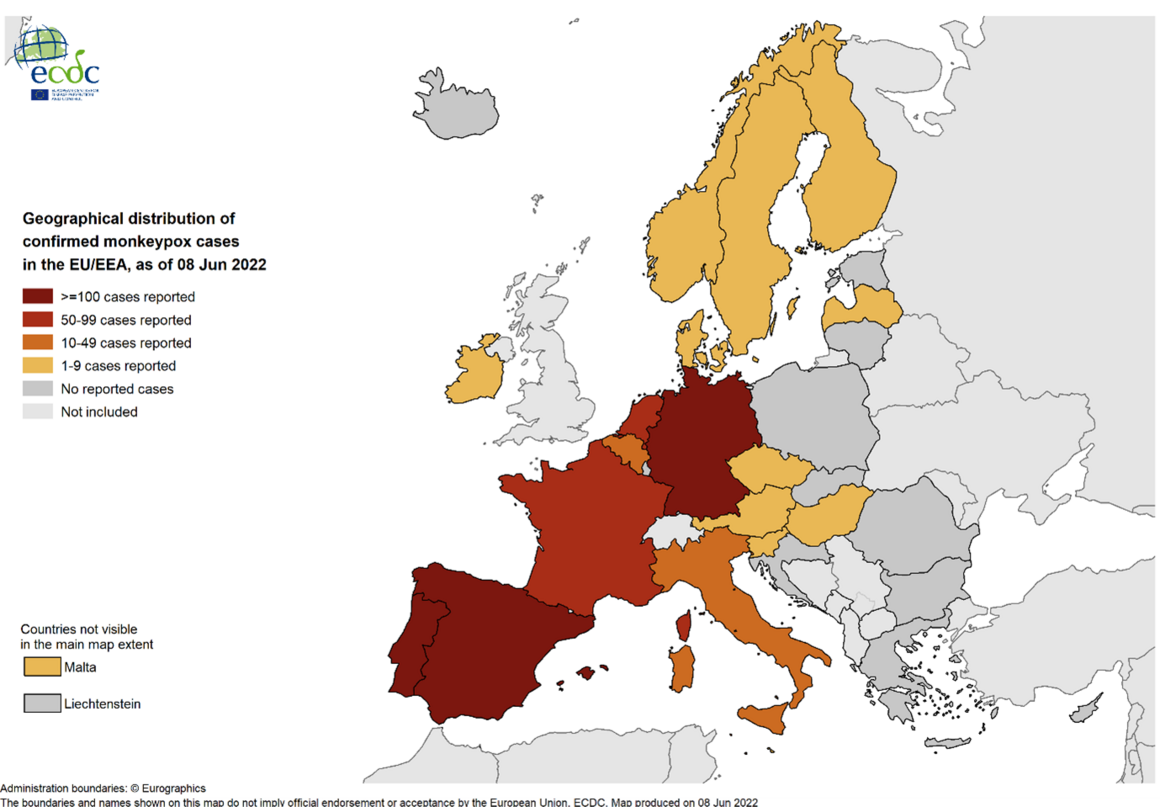
Worldwide update
As of 8 June 2022, a total of 473 cases have been confirmed in non-endemic European countries outside the EU/EEA as well as in the Americas, Australia, and Asia. Cases have been reported in United Kingdom (321), Canada (81), United States (35), United Arab Emirates (13), Switzerland (10), Australia (6), Israel (3), Argentina (2), Mexico (1) and Morocco (1).
Figure 2. Geographical distribution of confirmed cases confirmed cases of monkeypox worldwide, as of 8 June 2022
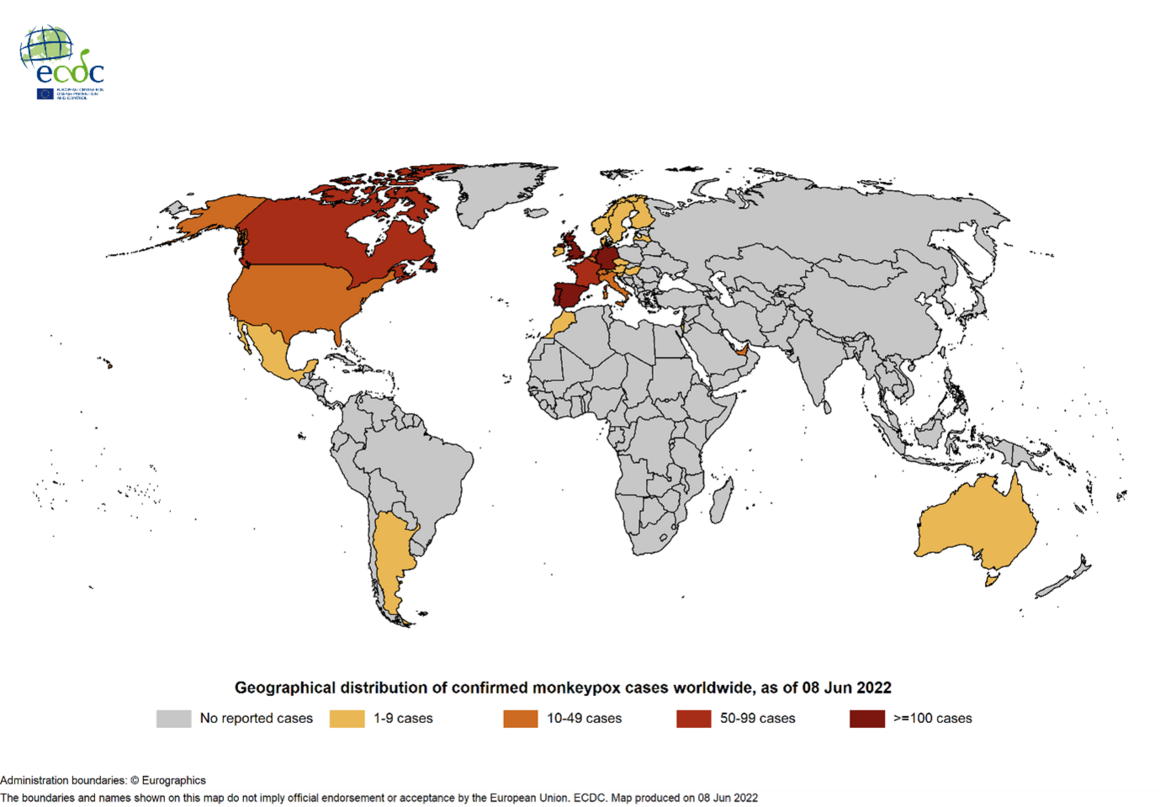
Phylogenetics of monkeypox virus
The monkeypox virus (MPXV) has a double stranded DNA genome of ~197 kb [1]. Two genetically distinct clades have been described, the Central African (Congo Basin) and West African clades[2]. Whole genome sequences of MPXV were extracted from GISAID EpiPox and GenBank. The phylogeny was performed using ParSNP [3] with MT903344.1 as reference, and visualised in Microreact [4]. The sequences from the West African clade are presented in Figure 3.
The EU outbreak sequences are a part of a distinct cluster from 2022 within the West African clade. There are two 2022 sequences from the US that are not part of this cluster, but still belong to the West African clade. Early media reports indicate that these are travel-related cases and are not part of the current outbreak [5, 6]. Limited sampling and sequencing of MPXV over the years makes it difficult to generate a hypothesis on the source of introduction for this outbreak.
Sequencing of MPXV can help us to understand virus transmission and patterns of spread. ECDC therefore recommends that countries deposit whole genome or partial genome raw reads and assemblies to the databases available for sequence sharing. Accession numbers can be reported in the standard data fields in TESSy. If public sharing is not feasible due to data privacy or for other reasons, ECDC encourages countries to submit assemblies by attaching them to the monkeypox event in EpiPulse or to upload data to the ECDC Sftp site. For further instructions, please e-mail typing@ecdc.europa.eu.
Figure 3. Phylogenetic tree of monkeypox virus sequences from West African clade as of 8 June 2022.
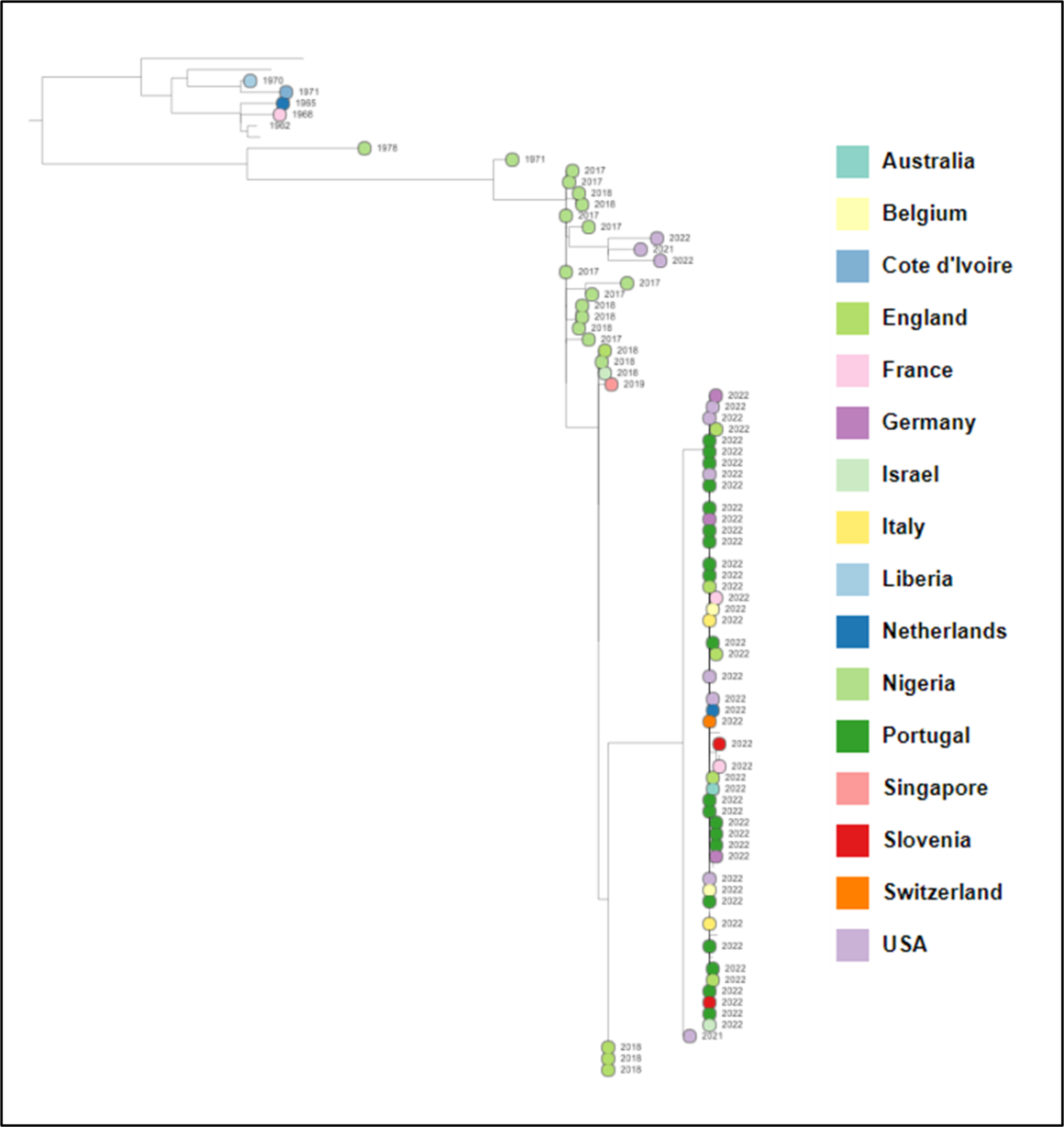
ECDC risk assessment
The trajectory of the outbreak so far does not affect the risk as previously assessed by ECDC in the "Monkeypox multi-country outbreak" Rapid Risk Assessment published on 23 May. The likelihood of MPX spreading in persons having multiple sexual partners in the EU/EEA is considered high. Although most cases in current outbreaks have presented with mild disease symptoms, monkeypox virus (MPXV) may cause severe disease in certain population groups (young children, pregnant women, immunosuppressed persons). However, the likelihood of cases with severe morbidity cannot be accurately estimated yet. The overall risk is assessed as moderate for persons having multiple sexual partners (including some groups of MSM) and low for the broader population.
References
[1] Kugelman JR, Johnston SC, Mulembakani PM, et al. Genomic variability of monkeypox virus among humans, Democratic Republic of the Congo. Emerging Infectious Diseases. 2014;20(2):232-239. Available at: https://www.ncbi.nlm.nih.gov/pmc/articles/PMC3901482/
[2] World Health Organization. Monkeypox fact sheet. 2022. Available at: https://www.who.int/news-room/fact-sheets/detail/monkeypox
[3] Treangen TJ, Ondov BD, Koren S, Phillippy AM. The Harvest suite for rapid core-genome alignment and visualization of thousands of intraspecific microbial genomes. Genome Biology. 2014;15(524). Available at: https://genomebiology.biomedcentral.com/articles/10.1186/s13059-014-052…
[4] Argimón S, et al. Microreact: visualizing and sharing data for genomic epidemiology and phylogeography. Microbial Genomics. 2016;2(11). Available at: http://mgen.microbiologyresearch.org/content/journal/mgen/10.1099/mgen…
[5] NBC News. Two distinct monkeypox variants found in U.S., adding to outbreak’s mystery. 2022. Available at: https://www.nbcnews.com/health/health-news/two-monkeypox-variants-found-us-rcna31894
[6] MedPage Today. CDC: Two Distinct Monkeypox Strains Detected in U.S. 2022. Available at: https://www.medpagetoday.com/infectiousdisease/generalinfectiousdisease/99052




